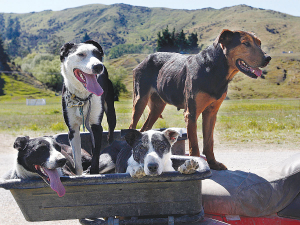With canine cough having a resurgence around the country the Veterinary Council of New Zealand (VCNZ) is reminding dog owners to keep an eye out for symptoms.
VCNZ Professional Advisor Seton Butler told Rural News that it can also be an issue for farm working dogs.
Canine Infectious Respiratory Disease (CIRD), or Infectious Tracheobronchitis is a highly contagious respiratory disease. Commonly called kennel cough, its symptoms can include having a loud and high-pitched cough that sounds like a goose honk or that there is something stuck in the dog's throat; loss of appetite; low energy; retching or hacking and nasal discharge.
Coughing is exacerbated by physical activity and can linger for several weeks.
Butler says that while normally farm dogs are pretty healthy and vaccinated, they can be at risk of kennel cough infection.
"If you have a set of working dogs on farm and they don't go near other dogs then they are at low risk - especially if they are vaccinated against kennel cough," he explains.
"However, some farm dogs may not be vaccinated for kennel cough and farmers need to check with their vets that their dogs' vaccinations include covering kennel cough."
Butler says there are four or five vaccinations that vets have in their repertoire and these may or may not have kennel cough included. He stresses that vaccination is the best way of keeping kennel cough at bay.
"I'd strongly advise farmers that their dogs' vaccines include kennel cough prevention."
Butler says while it has a low mortality rate, kennel cough can clear the way for other, more potentially dangerous, secondary infections.
"Kennel cough could be a problem for farmers that rely on dogs for mustering as if they get sick," he explains. "If dogs are not 100% they won't be able to work very well and also are at risk of getting other things like pneumonia."
As farm dogs are usually housed together, if one gets kennel cough then they all will get it.
Butler says the main risk is if dogs go off farm - say, to dog trials or another farm - and are exposed to kennel cough. He says another key risk of infection is it being brought onto the farm by visiting dogs.
"Farmers need to ensure that any dogs that come on farm - such as relatives' or friends from town's dogs - are vaccinated."
He says signs of kennel cough infection include dogs being off their food and running a temperature and advises if this is the case it would be worth a vet check-up.
"Canine cough can be tricky and complex to manage because it is often being caused by both a bacteria and viruses, with different vectors of infection having different durations in how long they can linger on surfaces or the environment and still remain infectious."
It spreads easily by aerosol between dogs through sniffing, sharing water bowls, and coughing and sneezing.
"Planning ahead will help you do your best to protect your dog."



















